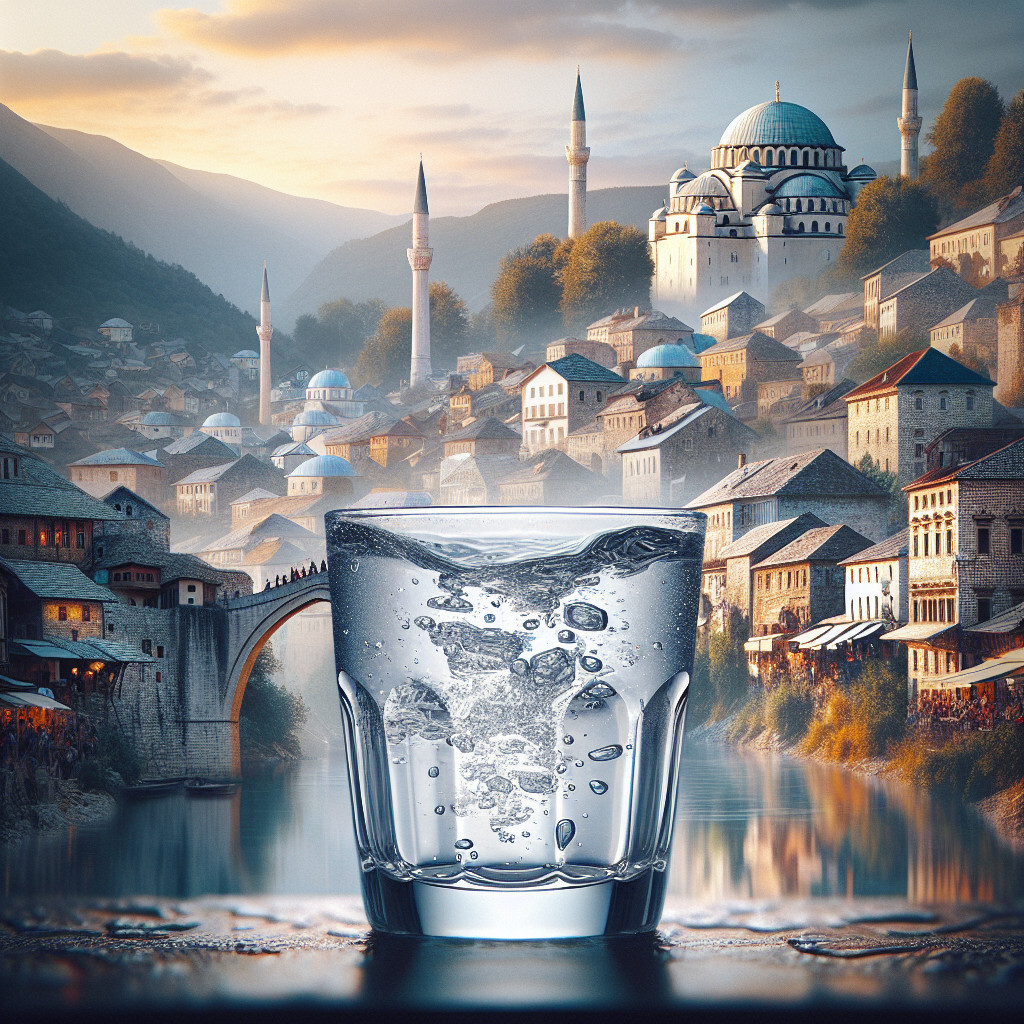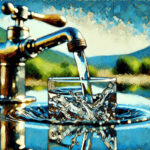-
Table of Contents
- Introduction
- Understanding the Quality of Tap Water in Bosnia and Herzegovina
- The Impact of Infrastructure on Bosnia and Herzegovina’s Tap Water
- Health Implications of Drinking Tap Water in Bosnia and Herzegovina
- The Role of Government in Ensuring Safe Tap Water in Bosnia and Herzegovina
- Q&A
- Conclusion
“Bosnia and Herzegovina’s Tap Water: Refreshingly Pure and Safe to Drink!”
Introduction

The tap water in Bosnia and Herzegovina is generally considered safe and clean for drinking. The country is known for its abundant water resources, including numerous rivers and lakes. The quality of tap water can vary depending on the region, but in major cities and towns, it is typically well-maintained and regularly tested to ensure it meets health and safety standards. However, in some rural areas, the tap water may not be as reliable due to less frequent testing and maintenance. Despite the overall good quality, some locals and tourists choose to drink bottled water for their personal preference or safety concerns.
Understanding the Quality of Tap Water in Bosnia and Herzegovina
Bosnia and Herzegovina, a country located in the southeastern region of Europe, is known for its rich history, diverse culture, and picturesque landscapes. However, one aspect that often goes unnoticed is the quality of its tap water. This article aims to shed light on the current state of tap water in Bosnia and Herzegovina, providing an understanding of its quality, safety, and the factors influencing it.
The quality of tap water in Bosnia and Herzegovina varies significantly across the country. In urban areas, the tap water is generally safe to drink, thanks to the country’s extensive water treatment facilities. These facilities employ advanced filtration and disinfection processes to remove harmful contaminants and ensure the water meets the necessary health and safety standards. As a result, residents in cities such as Sarajevo and Mostar can typically consume tap water without any concerns.
However, the situation is quite different in rural areas. Due to the lack of adequate water treatment facilities, the tap water in these regions may not be safe for consumption. The water sources in these areas are often exposed to various forms of pollution, including agricultural runoff and industrial waste, which can introduce harmful substances into the water. Consequently, residents in these areas are advised to boil their water before consumption or rely on bottled water.
The quality of tap water in Bosnia and Herzegovina is also influenced by the country’s infrastructure. Despite significant improvements in recent years, the country’s water supply system still faces several challenges. These include outdated infrastructure, inadequate maintenance, and frequent water supply interruptions. These issues can compromise the quality of tap water, making it unsafe for consumption.
Furthermore, the country’s geographical location also plays a role in the quality of its tap water. Bosnia and Herzegovina is home to several large rivers, including the Sava, Drina, and Neretva, which serve as major sources of drinking water. However, these rivers are susceptible to pollution from various sources, including industrial activities and agricultural practices. This pollution can adversely affect the quality of tap water, posing potential health risks to consumers.
Despite these challenges, efforts are being made to improve the quality of tap water in Bosnia and Herzegovina. The government, in collaboration with international organizations, has initiated several projects aimed at upgrading the country’s water supply system and enhancing its water treatment facilities. These initiatives are expected to significantly improve the quality of tap water, particularly in rural areas.
In conclusion, the quality of tap water in Bosnia and Herzegovina is a complex issue, influenced by a variety of factors including geographical location, infrastructure, and pollution. While the tap water in urban areas is generally safe to drink, caution is advised in rural areas due to potential contamination. However, with ongoing efforts to improve the country’s water supply system and treatment facilities, the future of tap water in Bosnia and Herzegovina looks promising. As always, when traveling to a new location, it is advisable to research the local water quality or consult with health professionals to ensure safety.
The Impact of Infrastructure on Bosnia and Herzegovina’s Tap Water
Bosnia and Herzegovina, a country located in the southeastern region of Europe, is known for its rich history, diverse culture, and picturesque landscapes. However, one aspect that often goes unnoticed is the state of its tap water. The quality of tap water in Bosnia and Herzegovina is significantly influenced by the country’s infrastructure, which has undergone considerable changes over the years.
The infrastructure of Bosnia and Herzegovina has been shaped by a tumultuous past, including the devastating Bosnian War in the 1990s. The war resulted in significant damage to the country’s water supply systems, leading to a decline in the quality of tap water. Despite the end of the war, the country has struggled to fully recover and rebuild its infrastructure, which has had a lasting impact on the quality of its tap water.
In the aftermath of the war, the country faced a daunting task of repairing and upgrading its water supply systems. The lack of adequate funding and resources has hindered the progress of these efforts. Consequently, many parts of the country still rely on outdated and inefficient water supply systems, which often fail to meet the required standards for water quality.
The quality of tap water in Bosnia and Herzegovina is also affected by the country’s geographical features. The country is characterized by a diverse landscape, including mountains, rivers, and forests. While these features contribute to the country’s natural beauty, they also pose challenges to the development and maintenance of its water supply infrastructure. For instance, the mountainous terrain makes it difficult to construct and maintain water supply systems, leading to issues such as water leakage and contamination.
Furthermore, the country’s water supply infrastructure is also influenced by environmental factors. Bosnia and Herzegovina is prone to natural disasters such as floods and landslides, which can cause significant damage to water supply systems. These disasters not only disrupt the supply of tap water but also increase the risk of water contamination.
Despite these challenges, there have been efforts to improve the quality of tap water in Bosnia and Herzegovina. The country has received support from international organizations, such as the World Bank and the European Union, to upgrade its water supply infrastructure. These efforts have led to improvements in the quality of tap water in some parts of the country. However, there is still a long way to go to ensure that all residents of Bosnia and Herzegovina have access to safe and clean tap water.
In conclusion, the quality of tap water in Bosnia and Herzegovina is significantly influenced by the state of its infrastructure. The country’s tumultuous past, geographical features, and environmental factors have posed challenges to the development and maintenance of its water supply systems. While there have been efforts to improve the situation, the country still faces a long road ahead to ensure the provision of safe and clean tap water for all its residents. Therefore, it is crucial for Bosnia and Herzegovina to continue investing in its water supply infrastructure and to seek support from international organizations to achieve this goal.
Health Implications of Drinking Tap Water in Bosnia and Herzegovina
Bosnia and Herzegovina, a country located in Southeastern Europe, is known for its rich history, diverse culture, and picturesque landscapes. However, one aspect that often goes unnoticed is the quality of its tap water. The health implications of drinking tap water in Bosnia and Herzegovina are a topic of interest for both locals and tourists alike.
The quality of tap water can vary significantly across the country. In urban areas, the tap water is generally safe to drink, thanks to the country’s stringent water treatment processes. The water is sourced from underground wells and rivers, and it undergoes rigorous purification procedures to remove harmful contaminants. These procedures include coagulation, sedimentation, filtration, and disinfection, which are designed to eliminate bacteria, viruses, and other harmful substances. As a result, the tap water in urban areas of Bosnia and Herzegovina typically meets the World Health Organization’s guidelines for drinking water quality.
However, the situation is different in rural areas. Here, the tap water often comes directly from springs or wells, without undergoing any treatment. This can lead to the presence of harmful bacteria, viruses, and parasites in the water, which can cause a range of health problems, from minor gastrointestinal discomfort to serious diseases like typhoid and hepatitis A. Furthermore, the lack of proper sanitation facilities in some rural areas can exacerbate the problem, as it increases the risk of water contamination.
In addition to microbial contaminants, the tap water in some parts of Bosnia and Herzegovina may also contain high levels of certain chemicals. For instance, in areas with heavy industrial activity, the water may be contaminated with heavy metals like lead and mercury, which can have serious health implications if consumed in large amounts over a long period. Similarly, in agricultural areas, the water may contain traces of pesticides and fertilizers, which can also pose health risks.
Despite these challenges, the government of Bosnia and Herzegovina has been making efforts to improve the quality of tap water across the country. This includes investing in water treatment facilities, implementing stricter water quality standards, and conducting regular water quality tests. These efforts have led to significant improvements in the quality of tap water in recent years, particularly in urban areas.
However, despite these improvements, it is still advisable for both locals and tourists to take certain precautions when drinking tap water in Bosnia and Herzegovina. This includes boiling the water or using water purification tablets, particularly in rural areas or if the water appears cloudy or has an unusual taste or smell. Additionally, it is recommended to drink bottled water when travelling in areas with known water quality issues.
In conclusion, while the tap water in Bosnia and Herzegovina is generally safe to drink in urban areas, there can be health implications associated with drinking tap water in rural areas or areas with known water quality issues. Therefore, it is important to take appropriate precautions and stay informed about the local water quality.
The Role of Government in Ensuring Safe Tap Water in Bosnia and Herzegovina
The quality of tap water in Bosnia and Herzegovina is a topic of significant interest, particularly in light of the country’s ongoing efforts to improve its infrastructure and public services. The government of Bosnia and Herzegovina plays a crucial role in ensuring the safety and quality of tap water, a responsibility that is both complex and multifaceted.
Bosnia and Herzegovina, a country located in Southeastern Europe, is blessed with abundant water resources. However, the quality of tap water varies significantly across the country. In urban areas, tap water is generally safe to drink, thanks to the government’s efforts to maintain and upgrade the water supply infrastructure. However, in rural areas, the situation is often different. Many rural communities rely on wells and springs for their water supply, which are not always adequately protected from contamination.
The government of Bosnia and Herzegovina has recognized the importance of ensuring safe tap water for all its citizens. Consequently, it has implemented a series of measures aimed at improving the quality of tap water across the country. These measures include the establishment of rigorous water quality standards, regular monitoring of water sources, and the implementation of water treatment processes.
The country’s water quality standards are based on guidelines provided by the World Health Organization (WHO). These guidelines specify the maximum allowable concentrations of various contaminants in drinking water, including bacteria, viruses, chemicals, and heavy metals. The government has established a network of laboratories across the country to regularly test tap water for these contaminants. If a water source is found to be contaminated, corrective measures are taken immediately to protect public health.
In addition to monitoring water quality, the government also oversees the treatment of tap water. Most urban areas in Bosnia and Herzegovina have water treatment plants that use a combination of physical and chemical processes to remove contaminants from water. These processes include coagulation, sedimentation, filtration, and disinfection. The government ensures that these plants operate according to international standards and that the treated water is safe to drink.
Despite these efforts, challenges remain. The country’s water infrastructure is aging and in need of significant upgrades. Furthermore, the government’s capacity to monitor and enforce water quality standards is limited, particularly in rural areas. To address these challenges, the government is investing in infrastructure improvements and capacity building. It is also working with international partners to secure funding and technical assistance for these initiatives.
In conclusion, the government of Bosnia and Herzegovina plays a pivotal role in ensuring the safety and quality of tap water. Through the establishment of rigorous water quality standards, regular monitoring of water sources, and the implementation of water treatment processes, the government is working to ensure that all citizens have access to safe drinking water. However, significant challenges remain, and continued efforts are needed to ensure the quality of tap water across the country.
Q&A
1. Question: Is tap water in Bosnia and Herzegovina safe to drink?
Answer: Yes, in most parts of Bosnia and Herzegovina, the tap water is safe to drink.
2. Question: What is the quality of tap water in Bosnia and Herzegovina?
Answer: The quality of tap water in Bosnia and Herzegovina is generally high, as the country has abundant natural water resources.
3. Question: Are there any regions in Bosnia and Herzegovina where tap water isn’t safe to drink?
Answer: In some rural areas and smaller towns, the tap water might not be safe to drink due to inadequate water treatment facilities.
4. Question: What precautions should be taken while drinking tap water in Bosnia and Herzegovina?
Answer: While the tap water is generally safe to drink, it’s recommended to use bottled water if you have a sensitive stomach or are in a rural area.
Conclusion
The tap water in Bosnia and Herzegovina is generally safe to drink, with high quality standards maintained. However, in some rural areas, it may be advisable to drink bottled water due to potential inconsistencies in water treatment.






